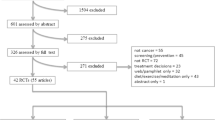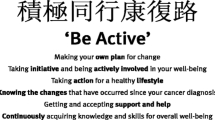Abstract
Background. In this article, we report on the effects of patient education for people with cancer in comparison to family and friends. Methods. Data are from 666 participants with cancer and 324 family and friends who completed preprogram and postprogram questionnaires. Results. Results show high levels of participant satisfaction and positive changes in measures such as illness perceptions and emotional functioning. In many cases, the pattern of change was different for people with cancer compared to family and friends. Conclusions. This education program may be useful for helping people with cancer cope with the disease, with some distinct benefits for family and friends.
Similar content being viewed by others
References
Morris SM, Thomas C. The carer’s place in the cancer situation: where does the carer stand in the medical setting? Eur J of Cancer Care (Engl). 2001;10:87–95.
Pasacreta JV, Barg F, Nuamah I, et al. Participant characteristics before and 4 months after attendance at a family caregiver cancer education program. Cancer Nurs. 2000;23:295–303.
Soothill K, Morris SM, Harman JC, et al. Informal carers of cancer patients: what are their unmet psychosocial needs? Health Soc Care Community. 2001;9:464–475.
Nijboer C, Tempelaar R, Triemstra M, et al. The role of social and psychologic resources in caregiving of cancer patients. Cancer. 2001;91:1029–1039.
Thomas C, Morris SM, Harman JC. Companions through cancer: the care given by informal carers in cancer contexts. Soc Sci Med. 2002;54:529–544.
Kristjanson LJ, Ashcroft T. The family’s cancer journey: a literature review. Cancer Nurs. 1994;17:1–17.
Kelly KP, Porock D. A survey of pediatric oncology nurses’ perceptions of parent educational needs. J Pediatr Oncol Nurs. 2005;22:58–66.
Kusch M, Labouvie H, Ladisch V, Fleischhack G, Bode U. Structuring psychosocial care in pediatric oncology. Patient Educ Couns. 2000;40:231–245.
Hoke LA. A short-term psychoeducational intervention for families with parental cancer. Harv Rev Psychiatry. 1997;5:99–103.
Carlson LE, Bultz BD, Speca M, et al. Partners of cancer patients: part II. current psychosocial interventions and suggestions for improvement. J Psychosoc Oncol. 2000;18:33–43.
Couper J, Bloch S, Love A, et al. Psychosocial adjustment of female partners of men with prostate cancer: a review of the literature. Psychooncology. 2006;15:937–953.
Hudson PL, Aranda SK, Hayman-White K. A psycho-educational intervention for family caregivers of patients receiving palliative care: a randomized controlled trial. J Pain Symptom Manage. 2005;30:329–341.
Northouse L. Helping families of patients with cancer. Oncol Nurs Forum. 2005;32:743–750.
Grahn G, Danielson M, Ulander K. Learning to live with cancer in European countries. Cancer Nurs. 1999;22:79–84.
McMillan SC, Tittle MB, Hill D. A systematic evaluation of the “I Can Cope” program using a national sample. Oncol Nurs Forum. 1993;20:455–461.
Roberts S, Black C, Todd K. The living with cancer education programme: II. evaluation of an Australian education and support programme for cancer patients and their family and friends. Eur J Cancer Care (Engl). 2002;11:280–289.
van der Molen B, Hutchison G. Learning to live with cancer: the UK experience of a European patient education and support programme. Eur J Cancer Care (Engl). 1999;8:170–173.
Hoey L. Living With Cancer Education Program: Facilitators’ Experience. Melbourne, Australia: The Centre for Behavioural Research in Cancer, The Cancer Council Victoria, Australia; 2006.
Todd K, Roberts S, Black C. The living with cancer education programme: I. development of an Australian education and support programme for cancer patients and their family and friends. Eur J Cancer Care (Engl). 2002;11:271–279.
Ell K. Social networks, social support and coping with serious illness: the family connection. Soc Sci Med. 1996;42:173–183.
Campbell HS, Phaneuf MR, Deane K. Cancer peer support programs—do they work? Patient Educ Couns, 2004;55:3–15.
Dunn J, Steginga SK, Rosoman N, et al. Review of peer support in the context of cancer. Psychosoc Oncol. 2003;21:55–67.
Finney Rutten LJ, Arora NK, Bakos AD, et al. Information needs and sources of information among cancer patients: a systematic review of research (1980–2003). Patient Educ Couns. 2005;57:250–261.
Squiers L, Finney Rutten LJ, Treiman K, et al. Cancer patients’ information needs across the cancer care continuum: evidence from the cancer information service. J Health Commun. 2005;10:15–34.
Morris SM, Thomas C. The need to know: informal carers and information. Eur J Cancer Care (Engl). 2002;11:183–187.
National Breast Cancer Centre, National Cancer Control Initiative. Clinical Practice Guidelines for the Psychosocial Care of Adults With Cancer. Camperdown, New South Wales, Australia: National Breast Cancer Centre; 2003.
Boudioni M, Mossman J, Boulton M, et al. An evaluation of a cancer counselling service. Eur J Cancer Care (Engl). 2000;9:212–220.
Sutherland G, White V, Livingston T. Cancer Connect Evaluation Report. Melbourne, Victoria: The Centre for Behavioural Research in Cancer, The Cancer Council Victoria, Australia; 2004.
Author information
Authors and Affiliations
Corresponding author
Rights and permissions
About this article
Cite this article
Sutherland, G., Hoey, L., White, V. et al. How does a cancer education program impact on people with cancer and their family and friends?. J Canc Educ 23, 126–132 (2008). https://doi.org/10.1080/08858190802039177
Issue Date:
DOI: https://doi.org/10.1080/08858190802039177




